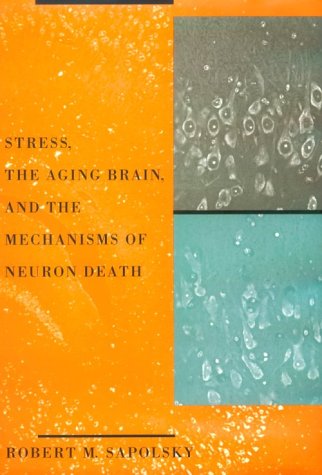Stress, the Aging Brain, and the Mechanisms of Neuron Death (Bradford Books)


sku: COM9780262193207USED
ACCORDING TO OUR RECORDS THIS PRODUCT IS NOT AVAILABLE NOW
$614.45
Shipping from: Canada
Description
Honorable Mention in the category of Biological Sciences, 1992 Professional/Scholarly Publishing Annual Awards Competition presented by the Association of American Publishers, Inc. Looking beyond the now widely recognized relationships between stress and physical illness, this accessible and engagingly written book suggests that stress and stress-related hormones can also endanger the brain. Strategies to reduce stress and methods to protect neurons from further damage are proposed, and the relevance for humans of the animal research findings are clearly delineated. Sapolsky provides an extensive review of the recent, exciting data on glucocorticoids, the adrenal steroid hormones (hydrocortisone or cortisol in humans) that are released during stress. Excessive exposure to these hormones can damage the brain and make neurons more vulnerable to neurological insults. The findings he reports and ideas he synthesizes may have profound implications for understanding brain aging and resistance of the brain to the damaging effects of strokes, seizures, and possibly Alzheimer's disease. In part I Sapolsky focuses on how the failure of glucocorticoid regulation and subsequent excessive secretion combine to cause a complex cascade of degeneration in the brain during aging. In part 11 he addresses the implications of glucocorticoid neurotoxicity for neurology. Each chapter includes a helpful summary of the major points discussed as well as a capsule review of information from the previous chapters. Robert M. Sapolsky is Associate Professor of Biology and Neuroscience at Stanford University. He is also Research Associate at the Institute for Primate Research, National Museums of Kenya, Nairobi, and a MacArthur Fellow.
Price history chart & currency exchange rate
Customers also viewed

$7.77
NEW Moissanite Stone Super White D Color Triangle Cut VVSS1 Small Size DIY Ring Necklace Earrings Main Materials Charms Gemsto
aliexpress.ru
$16.25
Dakimakura Anime Pillow Case Fate Neco-Arc Double-sided Print Of Life-size Body Pillowcase Gifts Can be Customized
aliexpress.com
$89.93
100% новый M365 оригинальный 36 В Аккумулятор 30000 мАч Kick 10S3P 18650 Аккумулятор для скутера Бесплатная доставка
aliexpress.com
$200.51
EP-430EP-510 Manual Hydraulic Clamp Press Plier 400mm Square with Safety Device Pressure H-Type C- Type Clamp
aliexpress.com
$25.18
Cashmere Sweater Women100%Pullover Vests Weaving Flowers Sleeveless Sweater Youthful Woman Clothes For Autumn Winter Women Tops
aliexpress.com
$13.45
4PCS Girls Cotton Antibacterial Panties Kids Thin Breathable Knickers Cute Print Soft Comfort Underwears 3+y Young Child Clothes
aliexpress.com
$21.56
Korean Fashion Short Sleeve Denim Shirt Men and Summer Streetwear Unisex Top Casual Double Pockets 100% Cotton Washed Jean Shirt
aliexpress.com
$17.51
Japanese JP Keyboard For Fujitsu For LifeBook A512 A530 A531 AH502 AH512 AH521 AH530 AH531 NH751 CP513261-01 6037B0063102
aliexpress.com
$6.01
Plastic Shoe Rack 14 Tier Storage Rack Organizer for Closet Narrow Shelf Cabinet Black Free Standing Racks Vertical Shoe Stand
aliexpress.com
$23.76
Leather And Fur Integrated Coat For Women's Jacket Lightweight Warm Imitation Fur Coat 2024 New Autumn Winter Fashion Coat
aliexpress.com
$3.06
3 Pcs Women Synthetic Hair Braided Hair Headbands Hair Hair Loop Hair Clasp Hair Band Hair Accessories Dress Accessories for
aliexpress.com
$1.89
Silica Gel Facial Brush Double Sided Facial Cleanser Blackhead Removing Product Pore Cleaner Exfoliating Facial Brush Face Brush
aliexpress.com
$55.30
Overcoat Parkas Winter Jackets for Men Motorcycle Jacket Man Boy Men's Coat Coats New Jakets Work Wear Cold Clothes Streetwear &
aliexpress.com
$21.55
Ручка переключателя кофемашины из нержавеющей стали, внешняя гладкая ручка, сменный рычаг подачи пара эспрессо
joom.ru
$1,383.62
Meyda Tiffany 27409 Tiffany Rosebush 2 Light 38 Wide Linear Chandelier - Tiffany Glass
walmart.com
$67.34
Redd Remedies Gouch!, поддержка нормального уровня мочевой кислоты, 120 вегетарианских капсул
iherb.com
$25.62
Женское трикотажное платье-свитер, облегающее плиссированное платье в Корейском стиле с милым бантом на воротнике, Осень-зима 2021
aliexpress.ru
$33.98
Толстовка JY с шахматным принтом для мужчин и женщин, уличная одежда, большие размеры, худи в клетку, в стиле Харадзюку
aliexpress.ru
$7.89
Детская вязаная шапка для мальчиков и девочек, мягкая теплая шерстяная шапка с оборками и косами для защиты ушей, красного цвета, на осень/зи...
aliexpress.ru
$25.24
Caline CP-28 ультра хорового пения или Алюминий сплав падел гитарной педали True Bypass педаль отличное Аксессуары для гитары Запчасти
aliexpress.ru
$2.53
Для Wltoys 124018 1/12 RC автомобилей Обновление Запчасти RC автомобиль спойлер запасные аксессуары
aliexpress.ru
$4.49
Лидер продаж! Чехол для телефона UMI London 2016, Эксклюзивный кожаный чехол высокого качества для UMI London, чехол для отслеживания телефона
aliexpress.ru
$18.06
Новая зимняя винтажная сумка на плечо 2021 модная женская плюшевая маленькая сумочка Роскошные дизайнерские женские сумки-мессенджеры Sac A Main
aliexpress.ru
$42.46
Настольный мини-усилитель звука TPA3116, Bluetooth 5,0, Hi-Fi стерео усилитель мощности класса D, 100 Вт для домашних динамиков
aliexpress.ru
$19.90
girl's dresses 2021 born toddler dress girls clothing autumn female baby bow puff sleeve long birthday party princess, Red;yellow
dhgate.com
$118.26
women luxurys designers bags 2021 tb organ chain strip small square litc crossbody bag totes designer handbag purse wallet handbags tote gpo
dhgate.com
$6.63
Square Pendulum Divination Tablecloth Ta-rots Card Pad Runes Altar Table Cloth Constellation Board Game Flannel
aliexpress.com
$155.33
lace wigs celie hair straight bob front with bangs 13x4 wig 150 density brazilian human, Black;brown
dhgate.com
$5.71
SO&EI Fashion Square Women Sunglasses Vintage Glasses Frame Trending Clear Beige Eyewear Men Shades UV400 Sun Glasses
dhgate.com
$1.51
Quick Release Plate Assembly P200Clamp Adapter for Manfrotto 577 501 500AH 701HDV Q5 Camera Tripod Accessories
aliexpress.com
$45.00
Elegant Lace Long Dress 2016 Brand Runway Women Three Quarter Sleeve Rose Embroidered Mesh Sexy Perspective Maxi Dress
aliexpress.com
$4.92
multipurpose unicorn shape foundation brush blush pro powder makeup brush kabuki brushes face nail art make up brush tool beauty cosmetics
dhgate.com
$40.62
mens конструктора куртка женской осенние куртки бурелома с капюшоном нового бренд женщинами и мужчины luxury куртка большого размером m-4xl, Black;brown
dhgate.com
$11.20
New Men's Canvas Waist Bag Fanny Pack Belt Hip Bum Military Motorcycle Multi-purpose Messenger Bags For Men
aliexpress.com
$23.91
Nail 72W 36 LEDs intelligent induction double light phototherapy machine nail LED phototherapy baking lamp drying machine nail
aliexpress.com









